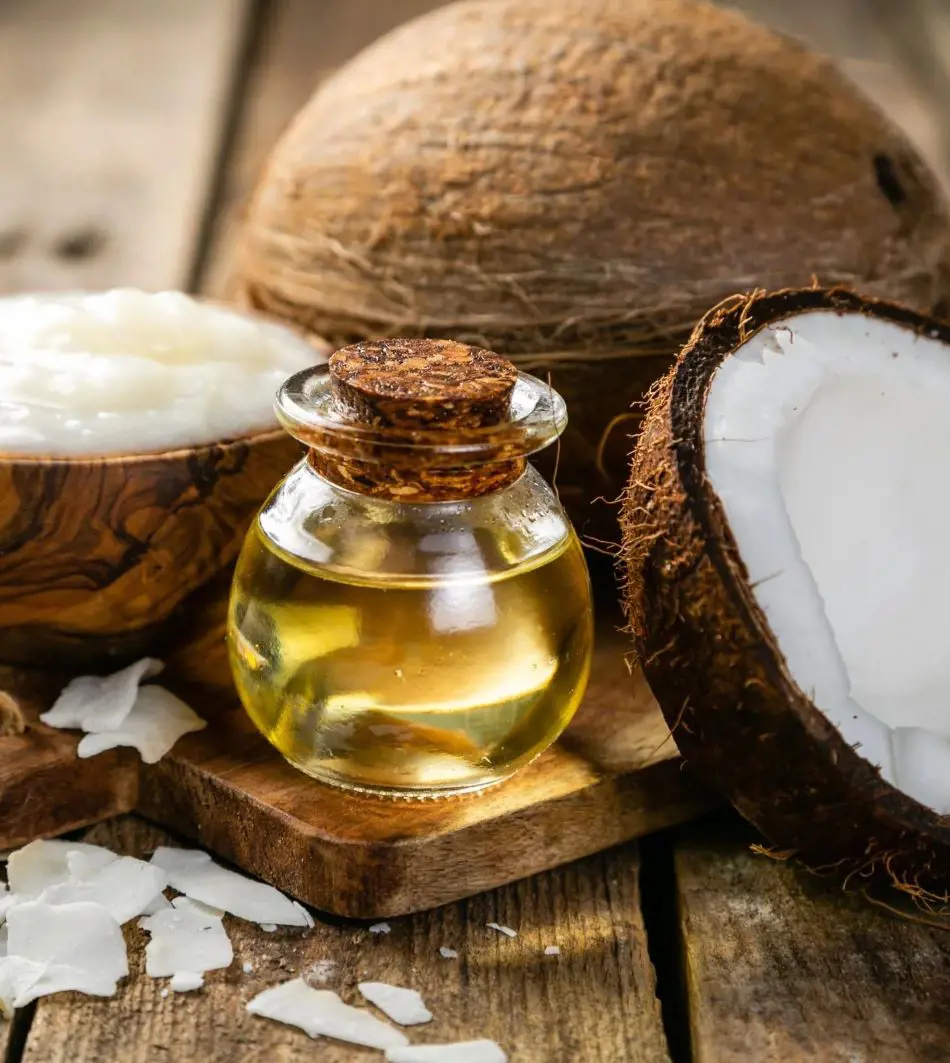10 MCT Oil Benefits Which Are Proven By Science

MCT oil is a supplement made from medium-chain triglycerides, a type of fat present in oils like coconut and palm oil. As the name implies, MCT oil consists of medium-length triglyceride chains. Thanks to their shorter length, MCTs are digested more quickly than the longer-chain fatty acids present in various other foods.
In recent years, MCT oil has become a widely popular supplement, with research suggesting potential health benefits like enhanced athletic performance and weight control. Now, let's delve into MCT oil health benefits supported by scientific evidence.
1. Promotes Weight Loss

Numerous studies have explored the connection between MCT oils and weight-related benefits. In a 2003 research, it was revealed that MCTs boosted calorie and fat burning in overweight men. Additionally, in 2014, another study showed that MCTs contributed to a notable rise in appetite-suppressing hormones, promoting a sense of fullness.
The findings imply that MCTs could play a supportive role in weight loss and management. Moreover, MCTs can be converted by your body into ketones, offering a fat-based energy source when carb intake is limited. Incorporating MCT oil into a ketogenic diet may potentially support staying in the fat-burning state of ketosis.
2. Manage Blood Sugar Levels

Research indicates that MCTs can enhance blood sugar levels and help manage diabetes. A 2007 study found that daily intake of MCT oil led to reduced body weight, waist size, and insulin resistance compared to those using corn oil with LCTs. However, recent studies on MCTs and blood sugar have produced mixed results.
A review of 18 studies on coconut oil, rich in MCTs, found that a meal with coconut oil may slightly improve post-meal blood sugar control. However, using coconut oil long-term had the opposite effect, increasing insulin resistance and impacting the body's ability to regulate blood sugar.
3. Good Source Of Energy

The body absorbs MCTs faster than long-chain triglycerides (LCTs) because of their shorter chain length. MCTs move swiftly from the gut to the liver without the need for bile, unlike longer-chain fats.
In the liver, fats undergo breakdown to either serve as fuel or be stored as body fat. MCTs easily enter the bloodstream without requiring breakdown, serving as an immediate energy source. On a ketogenic diet, MCTs can further convert into ketones in the liver, providing a source of energy for the brain cells as these ketones can traverse the blood-brain barrier.
4. Improves Athletic Endurance

Supporters of MCT oil suggest it can enhance energy and athletic endurance by lowering lactate levels, an indicator of fatigue in muscles. A 2009 study showed that consuming MCT-rich food, as opposed to longer-chain fats, increased the duration of high-intensity exercise for recreational athletes.
While the evidence is promising, a 2010 study notes that it's too limited to definitively say MCTs or MCT oil improve exercise endurance. Nonetheless, this doesn't hinder MCT oil's popularity as a supplement for athletes and bodybuilders seeking an energy boost and increased endurance.
5. Helps Manage Epilepsy

Researchers have observed that fasting elevates ketone production, potentially reducing the frequency of epileptic seizures. Given that MCTs can be converted into ketones, they may have a role in managing epilepsy. Although there are limited human studies on MCTs and epilepsy, in-vitro and animal studies indicate promising results.
A small study focused on adults with epilepsy who were unresponsive to medication. As a group, participants experienced a 42% reduction in seizures over 3 months with MCT oil supplementation. However, the authors advise that more studies are necessary. If you're thinking about using a ketogenic diet or MCT oil to manage epilepsy, consult your doctor first.
6. Promotes Gut Health

Your gut is home to trillions of microorganisms crucial for normal digestive function. MCT oil supports the growth of beneficial gut bacteria, strengthening the intestinal barrier. This, in turn, helps prevent harmful microorganisms and antigens from invading the gastrointestinal tract, thereby promoting gut health.
Additionally, consuming MCT oil may contribute to rebalancing the diversity of microorganisms in the gut. A study discovered that dietary supplementation with MCT reduced candidiasis, a fungal infection, in the gastrointestinal tracts of preterm infants.
7. Improves Cognition With Alzheimer’s Disease

A ketogenic diet gives your brain an alternative energy source called ketones, which might help brain cells survive better in Alzheimer's. Studies found that focusing on MCTs as the main fat source in a keto diet lets you include more carbs while still making enough ketones. This can make the diet more sustainable in the long run.
It was discovered that increased ketone use in the brains of those with mild-to-moderate Alzheimer's who consumed 30 grams of MCT supplements daily. Additionally, a 30-day trial showed improved cognition in individuals with Alzheimer's who took MCTs, especially those with APOE ɛ4-negative (gene). While the potential use of MCT oil for Alzheimer's appears promising, additional studies are needed.
8. Fights Yeast And Bacterial Growth

MCTs exhibit antimicrobial and antifungal effects, with potential anti-inflammatory benefits suggested by some researchers. High in MCTs, coconut oil was found in an older in-vitro study to reduce the growth of Candida albicans, a common yeast causing thrush and skin infections, by 25%. In a lab study, coconut oil was found to decrease the growth of the disease-causing bacteria Clostridium difficile.
In another study, virgin coconut oil slowed the growth of Staphylococcus aureus and aided immune cells in eliminating the bacteria, known for causing skin infections and other serious conditions. The potential of coconut oil to reduce yeast and bacterial growth may be linked to the presence of capric, caprylic, and lauric acid in MCTs. Yet, high-quality human research is necessary for further validation.
9. Helps Manage Autism

Limited evidence suggests that MCT oil might assist children in managing autistic characteristics. A ketogenic and gluten-free diet incorporating MCTs significantly reduced behaviors associated with autism in 6 out of 15 participating children. A few small studies have indicated some potential for ketogenic diets, with or without MCTs, to reduce autistic behaviors.
However, further research is necessary before definitive conclusions can be drawn. The safety and therapeutic benefits of such diets for autistic children remain unknown. It is acknowledged that implementing a restrictive diet for a child poses risks, including malnutrition and delayed growth.
10. Boosts Heart Health

A study found that compared to animal-sourced fats, the consumption of MCTs and coconut oil may contribute to a healthier blood lipid profile. MCT oil has also been associated with supporting weight and fat loss, potentially reducing the risk of heart disease. Older studies suggest that MCT-oil-based mixtures could positively impact other heart disease risk factors.
In rat experiments with fish oil and MCTs, researchers noted a significant reduction in C-reactive protein (CRP), an inflammatory marker linked to heart disease risk. However, an analysis of 7 trials found higher triglyceride levels with MCT oil compared to other fats or oils, which are associated with heart, stroke, and liver conditions. It remains unclear whether MCTs are a negative or positive choice for heart health.
Recent posts
Nutrition
Nutrition
Licorice Root: Benefits And Uses
You can spell it liquorice or licorice; this herb or root has been in use for centuries in most medicinal applications, as a natural sweetener and to enhance flavors. Regarding its origins, it comes from the root of the "Glycyrrhiza galbre" plant and...
Nutrition
Is Salmon Good For You? Nutritional Facts and Benefits
Salmon fish is a staple diet throughout the world, popular as a super food for its nutrients. Whether savored in sushi, poached, grilled, roasted, or pan-fried, salmon offers minerals and vitamins that contribute to healthy bodily functions. In addit...
Nutrition
25 Smoked Salmon Recipes That You Will Enjoy
Salmon is a silver-colored fish that is loaded with many nutrients, vitamins, and omega-3 fatty acids. Smoked Salmon is better for improving your health and reducing the risk of cancer, heart-related diseases, fights inflammation, reduces anxiety and...
Nutrition
Are Sausages Healthy? Nutrition And Health Benefits
Sausages are tasty in an addictive way, making them one of the most popular foods worldwide. You may have enjoyed this convenient food often, whether on a bun with mustard or grilled on a barbecue, the simple preparation methods are what makes its co...
Nutrition
20 Vegetables That Are Rich In Iron
Iron is essential for our bodies to function well. When we don't get enough iron, we often feel weak and tired. It's important to address iron deficiency early by eating the right foods. Fortunately, many vegetables are rich in iron and can help prev...
Nutrition
15 Cauliflower Nutrition Facts And Health Benefits
Cauliflower, a cruciferous vegetable, resembles a white variation of its relative, broccoli. Like broccoli, it has closely bunched florets attached to a thick core, often surrounded by a few leaves. While white is the most common color, cauliflower i...







